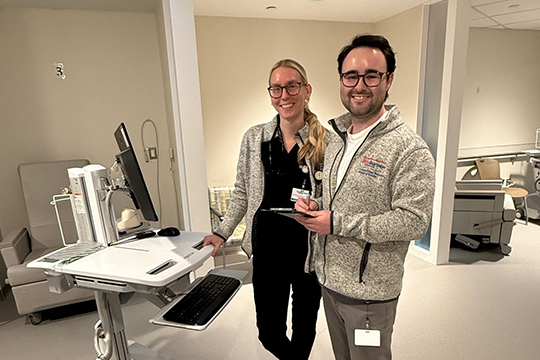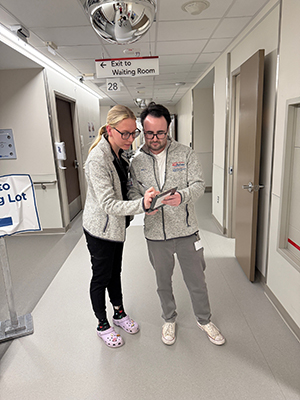
In New Jersey’s evolving healthcare landscape, RWJBarnabas Health’s Medical Scribe program has become an invaluable asset to clinicians and future healthcare professionals.
 Scribes are highly visible on the emergency room and inpatient floors within our hospital medicine groups, where they are responsible for observing and documenting doctor-patient interactions. This includes taking dictation from providers and fully and accurately documenting patient encounters, including the history of their hospital stay, why the provider ordered specific diagnoses, and any conversations with the patient , including shared decision-making, diagnostic review, and incidental findings. , and tracking information. Scribes also document in real time when critical patients are brought in by emergency medical services (EMS) or during code situations.
Scribes are highly visible on the emergency room and inpatient floors within our hospital medicine groups, where they are responsible for observing and documenting doctor-patient interactions. This includes taking dictation from providers and fully and accurately documenting patient encounters, including the history of their hospital stay, why the provider ordered specific diagnoses, and any conversations with the patient , including shared decision-making, diagnostic review, and incidental findings. , and tracking information. Scribes also document in real time when critical patients are brought in by emergency medical services (EMS) or during code situations.
Emergency physicians at RWJBarnabas Health began using scribes in the early 2000s, making the health system one of the first to adopt the practice. In early 2021, the Department of Practice Improvement, the first official scribe department within the system, was created to formalize and expand the program. RWJBarnabas Health’s Medical Scribe Program employs nearly 550 scribes across RWJBarnabas Health’s 12 hospitals, where they support physicians, physician assistants and nurse practitioners.
“Our scribes are an integral part of our patient care team, supporting documentation flow and improving the efficiency of our emergency and hospital medicine departments,” said Matt Viguerie, MBA, director of patient improvement. practice, emergency services and hospitalists, RWJBarnabas Health.
The responsibilities of a medical scribe go beyond simply recording patient interactions. As laboratory results or imaging studies become available, scribes play a crucial role in relaying this information to clinicians, ensuring that physicians stay informed without interrupting their patient care routines. “The purpose of a scribe is to allow the clinician to focus on patient care while the scribe focuses on documentation,” Viguerie said.
“Participating in the scribe program was one of the most impactful experiences on my journey to becoming an emergency medicine physician,” said Melissa Yu Dang, DOa former RWJBarnabas Health scribe who now practices emergency medicine. “Working closely with physicians gave me the unique opportunity to witness the practice of medicine and capture the dynamics of providers’ interactions with patients and staff, which gave me insight invaluable resources that have helped me immensely throughout my medical training. Best of all, this program allowed me to build lasting relationships with emergency providers and staff who, 10 years later, became my colleagues in the same department in which I wrote.”
A springboard to health careers
RWJBarnabas Health’s Medical Scribe program is designed to benefit the healthcare system and future healthcare professionals who join as undergraduates or recent graduates, with the goal of gaining direct clinical experience before continuing their studies in medicine, nursing or other health-related fields.
At RWJBarnabas Health, 39 physician assistants (PAs), 7 attending physicians, and 6 emergency department resident physicians trained as RWJBarnabas scribes practice within the system’s emergency department.
“Having so many of our scribes return to RWJBarnabas Health in advanced roles is a testament to the impact the program has on their career development,” Viguerie said.
One of the returning scribes Viguerie refers to is Maeve Maloney, PA-C, who now works in the emergency rooms at Newark Beth Israel Medical Center and Robert Wood Johnson University Hospital in Somerset.
“I had planned on going to medical school or PA school, and this seemed like the best way to get first-hand experience of what it would be like to work in the ER and learn people in the professions I hoped to join,” Maloney said. . “When I started PA school, I really think that having worked as a scribe gave me a leg up on my classmates who had different experiences. I had a basic understanding of many disease processes, diagnoses, and initial emergency management. I also knew or heard medical terminology that was completely new to my classmates from being immersed in it while working as a scribe,” she continued. Maloney was a full-time scribe for two and a half years when she became lead scribe.
The Future of RWJBarnabas Health’s Medical Scribe Program
The RWJBarnabas Health Medical Scribe Program is constantly evolving, with efforts currently being made to provide new workshop and mentoring opportunities and to encourage scribes to continue their careers at RWJBarnabas Health.
“Our scribes are incredible assets,” said Christopher Freer, D.O.senior vice president of emergency medicine and hospitalist at RWJBarnabas Health. “The support they provide to our physicians is invaluable and does not go unnoticed given the high level of care we provide to patients.
Please visit our web page for more information about the RWJBarnabas Health Scribe program and career opportunities.


